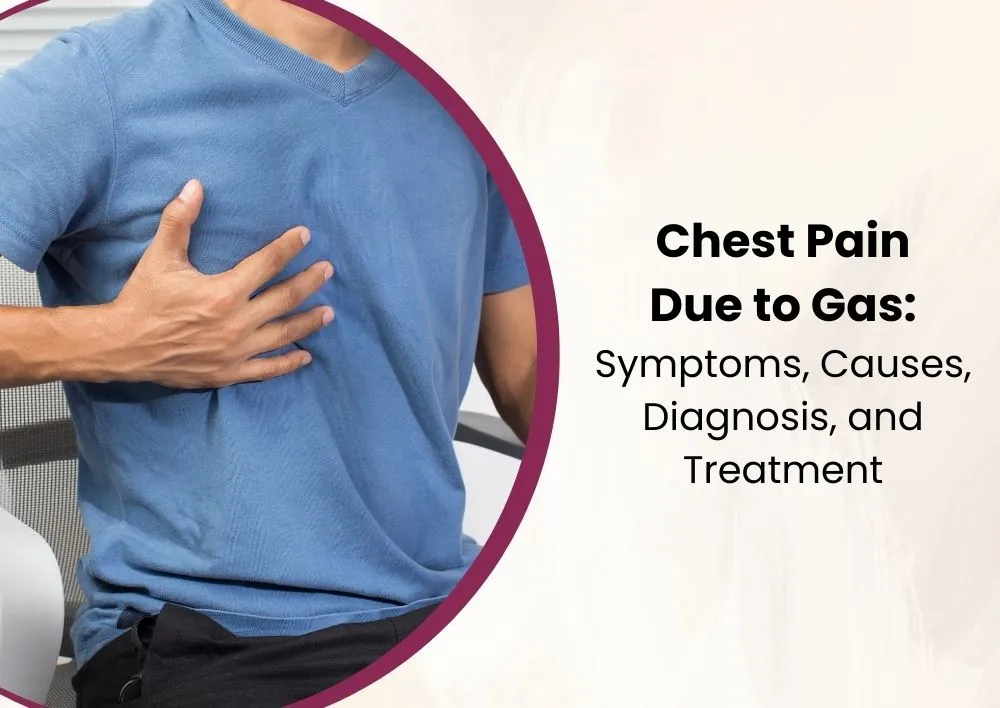Chest Pain Due to Gas: Symptoms, Causes, Diagnosis and Treatment
Chest pain is often a cause for concern, prompting individuals to think of serious heart conditions. However, it's important to recognize that not all chest pain originates from the heart; various medical conditions can be the culprits. Gastrointestinal problems, muscle strains, or respiratory conditions are among the potential causes. Recognizing specific signs associated with different types of chest pain is key to determining the appropriate course of action.
If you experience chest pain, it's important to pay attention and seek immediate medical help. Miracles Apollo Cradle/Spectra, the best hospital for chest pain in Gurgaon, provides comprehensive diagnostics and treatment to enhance your health. Our state-of-the-art facilities, equipped with cutting-edge technology, ensure accurate and efficient diagnostics for a thorough evaluation of your symptoms. Our team of the best chest pain treatment doctors conducts a detailed examination to identify the root cause of your chest pain due to gas and improve your health.
In this blog, we'll focus on chest pain caused by gas, delving into the factors that contribute to this discomfort and providing effective strategies to manage the pain. By gaining a better understanding of the root causes, you can make informed decisions about your health and seek appropriate medical attention when needed. Stay tuned for valuable information on recognizing, understanding, and managing chest pain caused by gas. Knowledge is the first step towards relief and well-being.
Types of Chest Pain
Here are several types of chest pain, along with potential causes:
1. Heart-Related Chest Pain:
-
Angina: It is chest pain that occurs when the heart muscle doesn't receive enough blood and oxygen. It is typically triggered by physical exertion or stress but subsides with rest. This condition can cause chest pain in females, often felt on the left side above the breast.
-
Heart Attack: A severe, crushing pain in the chest that may radiate to the arm, neck, jaw, or back. It is usually accompanied by shortness of breath, sweating, and nausea.
2. Gastrointestinal Chest Pain:
-
Gastroesophageal Reflux Disease (GERD): Stomach acid flows back into the esophagus, causing a burning sensation in the chest, often known as heartburn.
-
Esophageal Spasm: Sudden, severe chest pain caused by abnormal contractions of the muscles in the esophagus.
3. Musculoskeletal Chest Pain:
-
Costochondritis: Inflammation of the cartilage where the upper ribs attach to the sternum, causing localized chest pain.
-
Muscle Strain: Strained muscles or ligaments in the chest wall can result in chest pain, often worsened by movement or palpation.
4. Respiratory Chest Pain:
-
Pleurisy: Inflammation of the lining around the lungs, causing sharp chest pain that worsens when breathing.
-
Pneumonia: Infection of the lung tissue, which can lead to chest pain, specifically during deep breaths.
5. Psychogenic Chest Pain:
-
Panic Attack: Intense anxiety or panic can manifest as chest pain, along with symptoms like shortness of breath, dizziness, and a feeling of defeat.
6. Other Causes:
-
Rib Fractures: A break in one of the ribs can cause localized chest pain.
-
Shingles: The viral infection can cause chest pain before the characteristic rash occurs.
Symptoms of Chest Pain Due to Gas
Chest pain related to gas is often associated with conditions such as indigestion, bloating, or gas accumulation in the digestive system. However, chest pain due to gas can mimic symptoms of other conditions. Common signs and symptoms include:
-
Sharp pain: Chest pain due to gas can feel sharp or stabbing, typically in the chest area or upper abdomen.
-
Burning sensation: Some individuals may experience a burning sensation in the chest, similar to heartburn.
-
Pressure: Gas buildup in the digestive tract can lead to feelings of fullness or pressure in the chest.
-
Burping: Excessive belching or burping may be associated with gas-related chest pain.
-
Bloating: Abdominal discomfort, bloating, or a sensation of fullness may occur along with chest pain.
Recognizing these signs can help differentiate gas-related chest pain from other potential causes
If you're experiencing constant or severe symptoms, you should consult a chest pain specialist doctor near you to rule out more serious conditions.
Causes of Chest Pain Due to Gas
Several factors can contribute to the development of gas-related chest pain. Here are some common reasons for chest pain:
-
Swallowing Air: Eating or drinking too quickly, consuming carbonated beverages, chewing gum, or using straws can lead to swallowing excess air, which accumulates in the digestive tract and causes gas pain.
-
Dietary Factors: Certain foods can promote gas production, leading to chest pain. These include beans, lentils, broccoli, cabbage, onions, carbonated beverages, dairy products, artificial sweeteners, and high-fat foods.
-
Eating Habits: Consuming large meals, eating too quickly, or overeating can overwhelm the digestive system, resulting in gas buildup and chest pain after eating.
-
Lifestyle Factors: Smoking, chewing tobacco, and wearing tight clothing can contribute to swallowing air or putting pressure on the abdomen, leading to gas pain.
-
Stress and Anxiety: Psychological factors such as stress and anxiety can disrupt normal digestive processes, leading to gas buildup and chest discomfort.
-
Gastroesophageal Reflux Disease (GERD): Stomach acid flowing back into the esophagus can cause heartburn and pain in the middle of the chest.
-
Peptic Ulcers: Open sores on the lining of the stomach, small intestine, or esophagus can worsen with gas buildup, leading to chest pain.
-
Irritable Bowel Syndrome (IBS): A chronic digestive disorder characterized by abdominal pain, bloating, and chest pain due to gas.
-
Pancreatitis: Inflammation of the pancreas can cause severe abdominal pain, radiating to the chest.
-
Food Intolerances: Difficulty digesting certain foods, like gluten or lactose, can result in gas pain and other digestive symptoms.
-
Functional Dyspepsia: Also known as indigestion, it can cause constant or recurrent pain in the middle of the chest or upper abdomen.
-
Medication Side Effects: Certain medications, such as antibiotics, pain relievers, and laxatives, can cause gas pain as a side effect.
-
Heart Conditions: Less common, but certain heart conditions like angina or pericarditis can cause chest pain that may be mistaken for gas pain. It's essential to rule out cardiac causes, especially in individuals with risk factors for heart disease.
-
Inadequate Digestive Enzymes: Some individuals may lack adequate digestive enzymes required to break down certain foods properly, resulting in undigested food reaching the colon and producing gas.
-
Intestinal Blockages: In rare cases, intestinal blockages or obstructions can lead to gas accumulation in the digestive tract, causing severe chest pain. This medical emergency requires immediate attention.
Understanding these potential causes can aid in identifying and managing gas-related chest pain effectively.
Diagnosis of Gas-Related Chest Pain
Diagnosing gas-related chest pain involves a complete medical evaluation, including:
-
Medical History: A chest pain doctor will ask about your symptoms, medical history, dietary habits, and lifestyle factors.
-
Physical Examination: A physical examination may be conducted to evaluate signs of digestive disorders or other underlying conditions.
-
Diagnostic Tests: Depending on the clinical presentation, your doctor may order diagnostic tests such as X-rays, ultrasound, endoscopy, or laboratory tests to rule out other causes of chest pain.
Understanding your medical history, assessing physical signs, and conducting relevant diagnostic tests are essential steps in accurately identifying and addressing gas-related chest pain.
Treatment of Gas-Related Chest Pain
Treatment for gas-related chest pain aims to reduce symptoms and manage underlying causes:
-
Lifestyle Modifications: Making dietary changes, such as avoiding gas-producing foods, eating smaller meals, and chewing food slowly, can help reduce gas buildup.
-
Medications: Over-the-counter antacids, simethicone, or proton pump inhibitors (PPIs) may provide relief from gas-related chest pain.
-
Stress Management: Practicing relaxation techniques, such as deep breathing, meditation, or yoga, can help reduce stress and improve digestive function.
-
Prescription Medications: In cases where underlying digestive disorders are diagnosed, your healthcare provider may prescribe medications to manage symptoms and prevent gas buildup.
These approaches work together to alleviate symptoms and address the root causes of gas-related chest pain, providing comprehensive care for individuals experiencing discomfort.
Conclusion:
While chest pain can be alarming, it's important to recognize that not all chest pain indicates a cardiac emergency. Gas-related chest pain is a common issue that can be effectively managed with lifestyle modifications, medications, and stress management techniques. Understanding the symptoms, causes, diagnosis, and treatment of gas-related chest pain empowers individuals to take proactive steps and alleviate discomfort.
If you experience persistent chest pain or worsening symptoms over time, contact Miracles Healthcare. Our team of chest pain doctors is dedicated to making every medical journey easy and comfortable for you. We offer comprehensive healthcare services through multiple facilities: Miracles Apollo Cradle, Miracles Apollo Cradle/Spectra, Miracles Fertility & IVF Clinic, and Miracles Mediclinic. Conveniently located in Sec 14, Sec 56, and Sec 82, our facilities provide accessible healthcare for the people of Gurgaon.
For any queries or scheduling your appointment online, feel free to contact us.














Was the information useful?
9 0